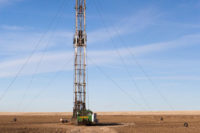Jeff Garby has served the drilling and environmental industries for years. Now, as president of Alucast Inc. in Ottawa, Ontario, Canada, he works closely with drilling companies around the globe. His company designs and manufactures custom manholes and well covers, so he has a lot to say about safe-guarding the hard work of drillers.
It’s a passion he’s turned to full time after years in the industry.
“You know, people think it’s crazy. But it’s well protection. I have a story behind it, because every time I drilled a well — I drilled for 15 years and I can tell you 90% of the wells that I installed, I put a crappy manhole cover on top of it, and it bothered me every time.”
He recalls a particularly tough drilling project, one he put “blood, sweat and tears” into. A year later, he returned to the site to see the well protection cracked and damaged.
“It’s my hole. I want it to be well represented,” he says. “And it wasn’t, and that bothered me.”
Garby says Alucast works to design durable well protection to help give drillers a sense of confidence in the finished work.
“Well protection will mitigate consequence,” Garby says. “So what it means is, you are working extremely hard making a great well — a water well, a monitoring well, a gas well, it doesn’t matter. … If you have a crappy manhole cover, surface contamination will roll in, come inside and contaminate your well, change the water levels, change the groundwater data that you’re receiving. It’s a huge problem. You have got to have great well protection today and, not only that, you got to install it correctly.”
Garby graduated from Ontario’s Fleming College with two years of hands-on training in water well, geotechnical and environmental drilling. He spent about 15 years drilling, everything from environmental and geotechnical work for Boston’s Big Dig to large-diameter wells in Florida. He started a drilling supply company, grew it to a handful of locations and sold it. Now, he’s focused all those experiences on Alucast.
“I tried to build a manhole cover that drillers would be happy to install,” he says.
Alucast also offers customization with logos or colors, so drillers can come back to a project weeks, months or even years later and easily pick out the wells they did.
Ultimately, Garby adds, it’s not just about pride in a nicely punctuated project. Depending on local regulations, it could also be a legal issue.
“The drillers are responsible for the holes today,” he says. “It’s your responsibility as a driller to protect your well correctly. … That’s big.” He says that contractors underestimate that responsibility, until their well protection fails and it potentially lands them in legal hot water.
The drillers are responsible for the holes today. It’s your responsibility as a driller to protect your well correctly. … That’s big.
Garby, of course, made a good case for well protection in our interview, but we covered a range of topics drawing on his years in the industry, including the decidedly hands-free direction in drilling that he expects to accelerate. Hand injuries, after all, account for a significant percentage of lost-time injuries in an industry famous for fast moving, heavy machinery.
“I don’t see us standing beside drills anymore pulling levers and pressing buttons,” he says. “I think remotes are going to allow drillers to step back 5, 10 feet for safety and drill wells. I think there are going to be more rod handlers out there.”
He also touched on what he calls an overlooked aspect of health and safety in the drilling industry: mental health. Tough work, long hours and travel can weigh on people.
“We absorb it, but drillers are tough breed with big egos. That’s just who we are,” he says. “But mental health is an issue. … When you’re drilling you’re away from your loved ones for five days a week and you have a decent per diem. That’s a recipe for disaster.”
He urges drillers to not fall into the trap of eating the Continental breakfast at their hotel and fast food for lunch, then having more beers than dinner to finish the day. It’s unsustainable, he says, when projects away from home can last for days or even weeks.
“We need to educate drillers on eating right on the road, being healthy and staying fit. That starts from a boss, a president of a company saying, ‘I’m going to give you an hour off on Thursdays, but I want you to work out. Or twice a week I’m going to take out a bit of your heavy shift. I’m going to absorb the brunt of it, and we’re going to learn about eating on the road.’ ”
That may sound overbearing, but he says that kind of top-down approach benefits both the employee and, ultimately, the company.
“People aren’t going to leave your company for $1,” he says. “They’re going to stay loyal to you because you care about their health you care about their family.”
The Full Interview
We interviewed Jeff Garby of Alucast Inc. for episode 9 of our Drilling In-Site series. Our talk covered well protection, the future of drilling, and even drilling on the moon and Mars. See the conversation at www.thedriller.com/insite, or listen to the full-length podcast version at www.thedriller.com/insite-podcast. Episodes also in Apple’s Podcast store. Search Drilling In-Site and tap Subscribe.
Visit Alucast Inc. at www.alucastworld.com.
Working on an interesting project or have industry wisdom to share? Email verduscoj@bnpmedia.com to be considered for a guest spot on Drilling In-Site.







Report Abusive Comment